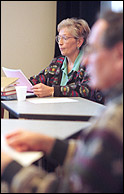on campus
of course
He says, she says
 ILLUSTRATION: Tzigane
ILLUSTRATION: Tzigane |
|
She proposed that they teach the course together. He was reticent, pleading time constraints and travel commitments. She said that she'd put the course together, since she'd already taught it, and "she knew where to put him." He accepted. She was pleased and so is the class.
She is education professor Phyllis Shapiro. He is Principal Bernard Shapiro. Together -- at least, when he's not away fundraising in California or signing international agreements in China -- they teach Seminar in Curriculum Inquiry, a graduate course designed to help practising teachers evaluate and develop curriculum in their area.
On this Thursday evening, Phyllis Shapiro is on her own and recounting to the class how she developed the "Shapiro Poetry Rating Scale" to help elementary school teachers find the best way to teach poetry.
As it turned out, Shapiro found that the middle class kids did better with writing semi-structured poetry, such as rhyming verse, while the poorer kids did better with forms that allowed more freedom. "They weren't afraid to make mistakes," she says.
One of the things that characterizes Shapiro's teaching style is the use of her years of experience, first as an elementary school teacher, then as a professor of education for the past 38 years, most notably at the University of Toronto, where she taught for 10 years before returning to her native Montreal.
Brian Moore, a history teacher at Lower Canada College, chose the course because the Shapiros were teaching it. "They're both very dynamic and they bring their lives into the course," he says. "Bernard talked to us, for instance, about going to China, and they had Gretta Chambers speak to us about the new curriculum." Chambers, a former chancellor of McGill, chaired the Advisory Board on English Education in Quebec and maintains a keen interest in Quebec education.
Elizabeth Dharagan, a former secondary math and science teacher in India, believes the Shapiros complement each other. "Phyllis has so many years of research experience, while Bernard's insight into the education system is so valuable. His research methods are more quantitative while she did her work in the school."
In fact, Bernard Shapiro's area in education has been largely in administration. Before becoming principal of McGill, for instance, he was the deputy minister of education in Ontario.
Curiously, while the principal and the professor have co-authored numerous papers, this is their first time teaching together.
Given the fun they have doing it, it may not be their last. On occasion, they've even staged mock disagreements about, for instance, the definition of curriculum. "We'll be having the best time," says Phyllis Shapiro, "and the students will be cracking up."
Bernard Shapiro, the more reserved of the two, especially appreciates teaching this course for what he learns from it. "It continues to be my experience that the individual learning the most from the course is the person who teaches it," he says, explaining that one learns from the process of course preparation and "simply as a result of the fascinating interaction with students during class time."
Bust a gut
 |
|
The weather is grim, your taxes are almost due and Bernard Landry wants everybody to start arguing about sovereignty again.
Need a laugh? Thought so.
Thankfully, the folks at Management Forum are supplying just that at their "Just for Laughs" noon-hour show on March 15 at Moyse Hall.
Phil Shuchat, whose resumé boasts of gigs "from Singapore to Red Deer, from New York to London," will showcase the material that helped him nab appearances in two upcoming TV comedy specials, Global TV's "Stand Up 2000" and the Comedy Network's "The Adventures of Comedy."
Also appearing will be Just for Laughs veteran Joey Elias, who recently appeared in the Wesley Snipes action flick The Art of War. According to Hour magazine, "[Elias's] material is sold by a smooth gregarious personality, grafted onto the body of a class clown!"
Cookies and coffee are free -- just be careful about chewing and chortling at the same time.
Summertime studying can be muddying
 |
|
For those with an interest in getting their hands into ecological work, Macdonald Campus's summer field semester may be just the thing. Now in its second year, the semester offers a choice of three courses on the theme of "human impacts on the environment."
The titles of the courses -- Ecological Monitoring & Analysis, Land Use: Redesign & Planning, Field Research Project -- may sound dry, but the work sounds anything but.
Comments from students who took the courses last year include: "I was able to work with kestrels [a bird of prey] and learn the proper capture techniques for brown snakes," from environmental biology student Sonia Leverkus.
Marian MacNair, a part-time science student, "tracked fauna in corn and soybean fields, discovered a problem in a community water system and sampled fish for a St. Lawrence River monitoring program... The courses offer a chance to absorb things that can't be taught in the classroom."
Which is exactly why natural resource sciences professor Chantal Hamel, coordinator of the summer semester, got the courses set up. "Summer gives us opportunities we don't have in the winter. Working outside allows the students to put into practice what they learn in class."
Last year, for instance, scientists from Montreal's Biosphere had students in the course Ecological Monitoring & Analysis help them identify parasites in the fish in Lake St. Louis. Some of the students' projects included: "An Inquiry into a New Measurement of Tree Growth" and "Earthworm Activity Under Corn and Soybeans."
One of the attractions of the three courses is the small class size, that last year averaged seven. This year, Hamel is hoping to attract more students and professionals in the field, such as CEGEP teachers. Anyone with one year of university study in a field related to the environment is eligible. The registration deadline is May 31. For more information, please call Marlene Parkinson in the Department of Natural Resource Sciences at 398-7890.
Learning for the sheer pleasure of it
 MILR member Thea Pawlikowska presenting medieval manuscript illuminations
MILR member Thea Pawlikowska presenting medieval manuscript illuminationsPHOTO: Owen Egan |
|
It's called the McGill Institute for Learning in Retirement, but one need not have a McGill affiliation in order to join. In fact, the only criteria are to be of retirement age and be prepared to participate in the teaching of subjects as varied as: "Ancient Views of the Afterlife," "The Japanese Enigma," a study group on Japanese society, and "The Doctor is in ... Your Bookshelf," a study group on the insights into human behaviour found in literature.
While the spring session only begins on April 9, some groups are already full, like "Introduction to Antiques" and "The Life and Times of Charlemagne," and any opera lovers had better hurry if they want to learn about the "Mythical, Mystical & Mysterious" world of opera.
That said, the fact that there are always two to four music groups per session and some of the groups, such as creative writing, are ongoing, takes the pressure off. Furthermore, the Institute is open year-round. It counts on its 1,000 members, who range in age from 55 to 90, to propose study groups and moderators volunteer themselves.
"We're always looking for new moderators. That's the basis for the organization," says the Institute's president, John Felvinci, a retired Columbia University professor of nuclear physics and a McGill PhD graduate. He, for instance, usually moderates "Topics in Today's Science," as well as a history group.
Initiated 12 years ago by a group of older continuing education students, the Institute is completely self-financing and is affiliated with the 300 chapter-strong North American network of ILRs. The fee that everyone pays per course -- moderator and group members alike -- grants everyone library privileges and pays for teaching aids, such as "first-class" audiovisual systems. "We try to have the best equipment so as to disseminate information easily," says Felvinci.
To join the MILR, phone 398-8234. For descriptions of the Spring session study groups, consult: www.mcgill.ca/conted/departments/institute/
Kudos
Dr. Frederick Andermann, from the Departments of Neurology and Neurosurgery and Pediatrics, was awarded the 2000 William Lennox Award from the American Epilepsy Society. The prize is awarded annually to an individual who has made significant contributions in the field of epilepsy. Andermann's research in areas such as progressive myoclonic epilepsies, epilepsy surgery and migraine-epilepsy syndromes has influenced colleagues around the world.
Professor Dmitry Jakobson, from the Department of Mathematics and Statistics, has been awarded an Alfred Sloan Fellowship, one of North America's most prestigious prizes for young scientists. An expert on quantum chaos, Jakobson will receive $40,000 U.S. to support his research.
Professor John Jonas, from the Department of Mining and Metallurgical Engineering, received the 14th Khwarizmi International Award in Tehran from Iranian president Mohammad Khatami. Nominated for the prize by an ex-graduate student who is now a professor in Iran, Jonas presented Khatami with an illustrated book about McGill at the award ceremony.
Emeritus Professor Eric Mountjoy, from the Department of Earth and Planetary Sciences, has been selected as the 2001 recipient of honorary membership in the Canadian Society of Petroleum Geologists. The CSPG's highest honour, the award is given for outstanding contributions to the Society and to the cause of petroleum geology.
Dr. Jacquetta Trasler, from the Departments of Pediatrics and Human Genetics, has received the 2001 Young Andrologist Award from the American Society of Andrology in recognition of her contributions to research in the field of male reproduction.

